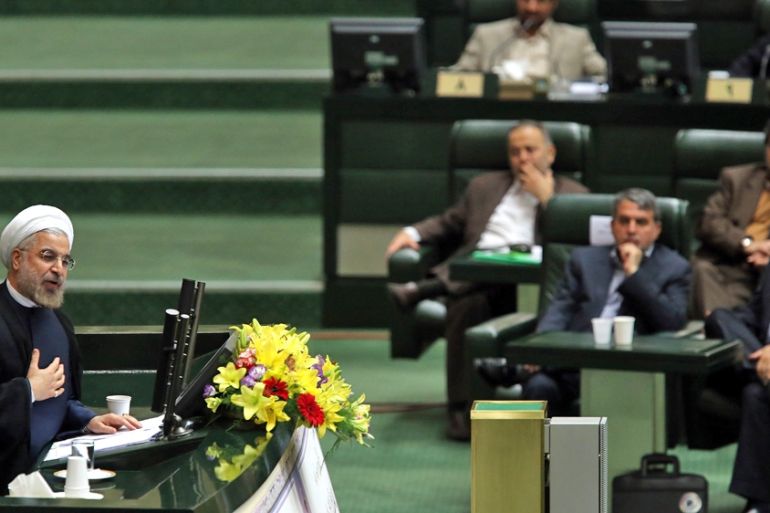Reporter’s jailing ‘reflects Iran power struggle’
Iranian hard-liners using arrests to wrest back power from moderate President Rouhani, analysts say.

The sentencing of Washington Post reporter Jason Rezaian for espionage in Iran is part of an ongoing political struggle, with hard-liners trying to show they still control the country’s levers of power ahead of two crucial elections, analysts say.
Sadegh Zibakalam, a professor at the University of Tehran, said it was doubtful Rezaian was ever involved in spying, but was used as a “bargaining chip” by opponents of the administration of President Hassan Rouhani.
Keep reading
list of 4 itemsWho will be Iran’s next president? | Start Here
Oil slumps two percent on possible return of Iranian supply
Border security a common concern for Pakistan and Iran: Rouhani
“If it were up to President Rouhani and the moderate faction, they would have released him [Rezaian] long ago in order to pave the way for better relations with the US and the West as a whole,” Zibakalam told Al Jazeera.
“This is to send the message: ‘Nevermind Rouhani; we hold the power in Iran,'” he said, referring to hard-liners who are strong in the country’s judiciary, as well as the security apparatus and parliament.
Earlier this week, the semi-official Iranian news agency Tasnim quoted Gholam-Hossein Mohseni Ejei, the judiciary spokesman, as saying Rezaian was “sentenced to prison” without specifying the length of the jail term.
RELATED: Iran sentences Washington Post reporter to prison
But as supporters and media watchdog groups try to determine the details of the sentence, Ghanbar Naderi, editor of the conservative newspaper Kayhan International, insisted there was “damning evidence” to send the Iranian-American journalist to jail.
“This man made a foolish mistake to come to Iran as a journalist. And he was a journalist, but at the same time, getting involved in espionage. He knows it very well,” Naderi told Al Jazeera.
He said the sentencing had “nothing to do with dirty politics”, or reports that Iran wants to have a prisoner swap with the United States.
However, Naderi added it was a clear message to reporters: “If you want to survive here, you have no choice but to follow the rules and regulations. Otherwise, you will be breaking the law; they will put you behind bars without any delay.”
He said Iranian prosecutors were keeping the evidence against Rezaian out of the public to avoid further embarrassment for the US.
Escalation of arrests
However, Holly Dagres – an Iranian-American political analyst who frequently visited Iran – disagreed with Naderi’s comments, saying as in past cases of arrests and convictions, “there really is no evidence of these allegations” against Rezaian.
|
|
“Something as simple as a political philosophy book could be found in your home and then turned into evidence of sedition,” Dagres told Al Jazeera.
Citing the 2009 arrest of Maziar Bahari, an Iranian-Canadian journalist, Dagres said Iranian intelligence used a skit from a US comedy programme, The Daily Show, to accuse Bahari of spying.
“That’s the sort of mind-set some of these Iranian authorities have. Whether they believe their ridiculous accusations or not is the real question,” she said.
Dagres said there was also a clear link between the Iran nuclear deal signed last July and the recent “escalation of arrests”, including that of Iranian-American businessman Siamak Namazi, who was nabbed by the Revolutionary Guard while visiting his family in Tehran.
She said hard-liners in the Iranian government tend to target anyone “preaching rapprochement” with the West.
“Hard-liners fear Western infiltration will seep through and eventually bring about regime change in Tehran,” said Dagres.
Two other Iranian-Americans – former Marine Amir Hekmati of Flint, Michigan, and Saeed Abedini, a pastor from Boise, Idaho – are also in Iranian custody. Hekmati was accused of spying and has been held since 2011. Abedini was convicted in 2013 for threatening Iran’s national security by participating in religious activities.
With the recent developments, Dagres said there is apprehension about going to Iran, which she last visited in 2013. Those targeted were not ordinary Iranian-Americans, but “people armed with a pen or voice”, she said.
Critical elections
As the country heads towards two crucial elections in parliament and the Assembly of Experts in February, tensions will continue to rise with the hard-liners putting more pressure on the Rouhani administration, said Saeid Golkar, a visiting fellow for Iran policy at the Chicago Council on Global Affairs and lecturer at Chicago’s Northwestern University.
Golkar said the arrests of prominent Iranian-Americans, as well as local journalists and activists, were part of the election strategy of conservatives to fire up supporters, while discouraging Rouhani’s followers from going to the polls.
“As a rule of the thumb, I believe that six months before any election in Iran, you can’t predict anything. The situation is very politicised,” Golkar told Al Jazeera.

“This unpredictability is part of the atmosphere of authoritarianism in Iran.”
The hardliner strategy has worked in the past – during the second term of then-President Mohammad Khatami – and it could work again in 2016, Golkar said.
It’s up to Rouhani to counter that politically and keep his supporters excited, said Golkar, adding the president’s actions so far have disappointed his backers since his 2013 election.
Rouhani can’t rely solely on the lifting of Western sanctions in January from the nuclear deal to gain momentum in the polls, Golkar said, as it could take another year or more for Iranians to benefit from sanctions relief.
“But if Rouhani can keep the people motivated in the next three or four months, he can win the elections. If he doesn’t have any cards to play to get people excited about, I think he will lose the election,” he said.